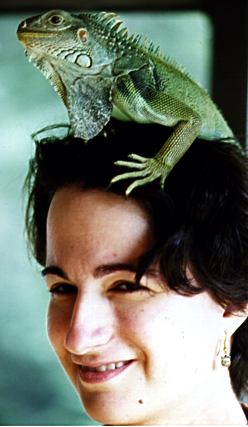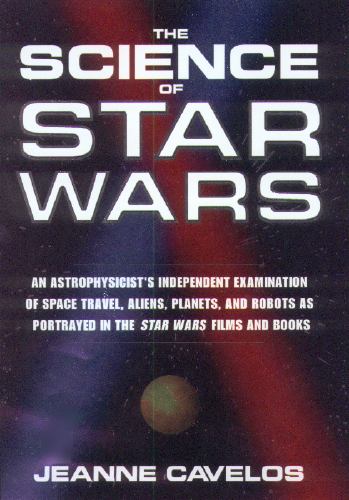Interviews -
Face To Face With The Masters
Any citizen of the galaxy may be summoned to answer to the Jedi Council. Here you may read the transcripts of such sessions.
Cellblock 1138 - 1997-1999 - 2000 - 2002 - 2003+
Jeanne Cavelos - The Science of Star Wars

I recently had the opportunity to talk with
Jeanne Cavelos, author of the new unofficial book THE SCIENCE OF STAR WARS. There were a lot of interesting things to discuss concerning her book, so let's get into it!
TFN: When did you first see Star Wars? What was your impression of it?
Jeanne: I saw the first movie within the first week or so of its release, in May
1977. I was 17 years old, a junior in high school planning to go to
college and study astrophysics. I'd been fascinated with space travel
and
the possibility of alien life since I was very small. (I used to love
STAR
TREK, which came out when I was 6 years old. I didn't know the word
"Trek," so I thought the name of the show was STAR TRUCK. I kept
waiting
for the truck to show up.) I loved to think about the big issues
raised
in science fiction, like, Will the universe keep expanding or will it
collapse at some point? Does alien life exist? Could we travel
rapidly to
other stars? What will we do when the sun burns out?
I was completely blown away by the opening shot of STAR WARS (now
called A
NEW HOPE). As that huge star destroyer flew out of the screen after
Princess Leia's ship, I literally felt like I couldn't breathe. I had
never seen such a huge spaceship in my life. My heart was racing--I was
totally hooked. People who didn't see the movies back then don't have
the
same experience with it. The effects were so much ahead of what had
been
done up to then; it was an amazing experience. By the end of the
movie, I
was even more excited. I had never visited such a bizarre,
exhilarating,
awe-inspiring, fully realized universe. I wanted to live in that
"galaxy
far, far away." And so I went back and visited, many, many times, for
two
hours at a time.

TFN: What is the new book about?
Jeanne: THE SCIENCE OF STAR WARS explores the science underlying the four STAR
WARS
films. I take the latest scientific theories and research and use
them to
illuminate what we see in STAR WARS, to consider how likely the movies
are.
The book answers questions posed by the movie, such as, How might
spaceships like the Millennium Falcon make the exhilarating jump into
hyperspace? Could light sabers possibly be built, and if so, how would
they work? How close are we to creating robots that look and act like
R2-D2 and C-3PO? Might we access a "force" with our minds to move
objects
and communicate telepathically with each other?
The book has five chapters: planetary environments; aliens; droids;
spaceships and weapons; and the Force. People can find an expanded
table
of contents and excerpts from the book on my site,
http://www.sff.net/people/jcavelos.
TFN: How do you approach parts of Star Wars that are NOT scientifically
accurate?
Jeanne: My purpose in writing the book was not to nitpick, but to scientifically
explore the STAR WARS universe. So I limit the nitpicking in the book
to
one sidebar, where I let scientists in a variety of fields share the
scientific inaccuracies that most got their goats. Outside that
sidebar,
I'll point out when the events shown in the movie are clearly
impossible--or scientifically very unlikely--yet I'll go on to explore
whether similar events might be possible, or whether scientists have any
theories that might allow us to avoid this problem. I don't white-wash
the
flaws in the films, but I'm far, far more interested in exploring the
possibilities inherent in the films than in nitpicking them.
TFN: Lucasfilm is now suing the publisher of another unauthorized
book
about Star Wars. Is this a concern for this title?
Jeanne: I was very careful in writing the book not to infringe on the Lucas
copyrights in any way. I am a huge fan of the movies and don't want to
take anything away from George Lucas that is rightfully his. There are
certain guidelines for writing unauthorized books, and I followed them
carefully. The lawyers at the publishing house, St. Martin's Press,
also
looked carefully over the text to make sure it didn't infringe in any
way.
So that shouldn't be a problem.
TFN: What is the most scientifically accurate thing in the films?
What
most sparks the imagination of scientist and engineers?
Jeanne: That's a hard question to answer. But one clear example is the use of
hyperspace to travel long distances. This is one of the top methods
scientists now envision to travel rapidly from one star to another, or
from
one end of the galaxy to another. Hyperspace is an area outside the
four-dimensional space-time of our experience, in additional
dimensions.
Scientists are now considering many ways of reaching hyperspace, and
how it
might serve as a "short cut" between one point and another, just as it
does
in the movies. Wormholes might be used to create hyperspace tunnels; or
string theory might reveal ways to uncurl additional dimensions and use
them for travel.
TFN: What is the impression of Star Wars in the scientific community?
Star Trek seems to be the preferred fiction among them.
Jeanne: When STAR WARS first came out, most scientists considered it completely
unscientific. I heard many of these arguments from my colleagues: We
cannot travel faster than the speed of light. Life on Earth arose
through
such an unlikely combination of factors that the chance that all these
factors exist on another planet to create alien life is vanishingly
small.
Sophisticated robots, when we can build them, will not act human and
emotional, but will be logical. And the Force is pure fantasy.
Yet an amazing thing has happened. In the 22 years since the first STAR
WARS movie came out, science has been catching up with George Lucas.
Physicists have come up with theoretical methods of rapid space travel,
as
I mentioned earlier. Recent discoveries suggest alien planets and alien
life are much more common than we previously believed. Many
robotocists
now think emotions may be a key component in creating intelligent
robots.
And a few scientists have theories that can incorporate the Force.
While many scientists still have this attitude that STAR WARS is not
scientific, what I found in interviewing many scientists is a belief
that a
future involving many of the elements we see in the movies may well
someday
be possible.
TFN: Some people think it is too nitpicky to compare Star Wars and
science since it is purely fantasy/fiction. What is your view on
that?
Jeanne: In STAR WARS, George Lucas combined elements from many different sources
and alchemized them into something completely new.
Yet STAR WARS clearly has many science fictional elements in it. There
are
robots, space ships, aliens, lasers. So I think it's fair to examine
whether those elements are presented in a realistic way. As I worked on
the book and talked to fans, I ran into many of them who felt the
science
shouldn't be examined, particularly as relates to the Force. A few of
them
begged me to "leave it alone!" They were afraid that there *is* no
science
behind the STAR WARS films, and so don't want to see them destroyed by
an
in-depth examination. Yet this is not the case at all. These is a
scientific basis behind much of what we see in the films. And there are
even scientific theories that postulate a force similar to the Force!
So
don't be afraid.
TFN: What are you doing now and how has Star Wars affected your career?
Jeanne: Let me answer the second part first. STAR WARS fueled my interest in
space
travel and the possibility of alien life, and confirmed for me that I
had
chosen the right path--to study astrophysics. Later, though, as I
worked
in the field, teaching astronomy and working in the Astronaut Training
Division at NASA, I became frustrated when my colleagues did not find my
interest in science fictional issues to be appropriate. (At NASA, I
had a
black & white photo of Han Solo firing the quad laser cannon in the pod
of
the FALCON over my desk. Many colleagues would comment on how they
loved
the movie, but in the next breath say how "silly" it was.) Exploring
how
one might reach "hyperspace" or under what conditions alien life might
exist on other planets was not widely considered acceptable. (These
days,
such issues are believed much more possible and so are much more widely
acceptable.)
So I felt I might belong more in science fiction. I went into a career
in
publishing and ran the science fiction/fantasy program at Bantam
Doubleday
Dell, where I worked for eight years. A few years ago, I decided I
really
wanted to focus on my own writing, so I left and moved to New
Hampshire.
This is my third book, and it really thrilled me to be able to combine
my
love of STAR WARS and my fascination with science, and to explore all
those
compelling
questions raised by the movies. My next project is a trilogy of
BABYLON 5
novels.
TFN: Will there be another "Science of" book about Episode I?
Jeanne: Although I haven't seen Episode 1 yet, I have learned a fair amount
about
it from various sources--including your site! So the book does include
discussions of a number of scientific issues raised in THE PHANTOM
MENACE.
If people want me to write another book about the new movie, though,
I'd be
happy to! Researching these fascinating issues--like could their be one
force that simultaneously controls and connects the entire universe--is
a
wonderful experience. I can't imagine a better job than exploring the
STAR
WARS universe and getting paid for it!
TFN: There seems to be a distinct effort by Lucasfilm to make the
ships and creatures more scientifically accurate. From what you've
seen in the trailer and online, is this your impression?
Jeanne: Yes, I've felt that too. I don't think George Lucas has been terribly
concerned with scientific accuracy at any point along the way. He has a
vision and a story to tell, which is a fascinating blend of science
fiction, fantasy, and mythology, and I believe that's his priority.
But I
think he has surrounded himself with people who are connected to science
and concerned with it, and so when they design an alien, for example, it
has a scientific basis to it that adds to its plausibility. I've
noticed
that in several cases.
TFN: Where will you be when Episode I comes out?
Jeanne: At the theater with the best screen and best sound within driving
distance!
And wearing my 22-year-old Han Solo T-shirt, which I've kept carefully
in
a box in my closet all this time.

